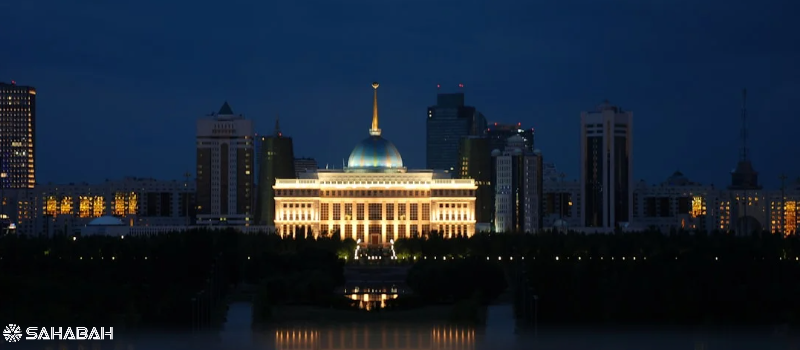Kazakhstan and Israel have maintained diplomatic relations since 1992, shortly after Kazakhstan gained independence following the dissolution of the Soviet Union. However, the nature of their relationship has been intricate, shaped by various geopolitical factors and regional dynamics. This comprehensive article delves into the nuances of Kazakhstan’s stance towards Israel, examining historical ties, areas of cooperation, challenges, and future prospects.
Historical Overview: Kazakhstan and Israel’s Diplomatic Ties
Historical Background
Kazakhstan was among the first countries in Central Asia to establish diplomatic relations with Israel in 1992. This move was significant, as it marked a departure from the Soviet Union’s historically strained relationship with the Jewish state. Kazakhstan’s decision was influenced by its desire to forge new international partnerships and its recognition of Israel’s economic and technological prowess.
The establishment of diplomatic ties was also facilitated by the presence of a sizable Jewish community in Kazakhstan, which has played a crucial role in fostering cultural and economic exchanges between the two nations.
Political and Economic Cooperation
Over the years, Kazakhstan and Israel have engaged in various areas of cooperation, including trade, investment, energy, and agriculture. Bilateral agreements have been signed to promote economic collaboration and facilitate the exchange of expertise in sectors such as technology, healthcare, and education.
However, the relationship has not been without its challenges. Kazakhstan has had to navigate the delicate balance between maintaining ties with Israel and preserving its relationships with Arab and Muslim nations, some of which have been critical of Israel’s policies towards the Palestinians.
Kazakhstan’s Stance on the Israeli-Palestinian Conflict
Official Position
Kazakhstan has consistently advocated for a peaceful resolution to the Israeli-Palestinian conflict through diplomatic means. The country has supported the two-state solution, which envisions the establishment of an independent Palestinian state coexisting alongside Israel.
In international forums, such as the United Nations and the Organization of Islamic Cooperation (OIC), Kazakhstan has generally adopted a balanced approach, refraining from overtly criticizing either side while calling for dialogue and compromise.
Balancing Act
As a predominantly Muslim nation with strong ties to the Arab world, Kazakhstan has had to carefully navigate its relationships with Israel and its Arab and Muslim allies. The country’s multi-vector foreign policy, which aims to maintain good relations with various global powers, has played a role in shaping its stance on the Israeli-Palestinian conflict.
Kazakhstan has sought to position itself as a potential mediator in the conflict, offering its good offices to facilitate negotiations and promote regional stability. However, this balancing act has not been without its challenges, as domestic public opinion and the influence of ethnic and religious groups within Kazakhstan have also been factors to consider.
Areas of Cooperation and Mutual Interests
Economic and Trade Relations
Despite the complexities surrounding the Israeli-Palestinian conflict, Kazakhstan and Israel have maintained robust economic and trade relations. Bilateral trade volumes have steadily increased over the years, with key sectors including agriculture, energy, and technology.
Kazakhstan has been a significant supplier of oil and gas to Israel, while Israeli companies have invested in various sectors of the Kazakh economy, such as telecommunications, agriculture, and renewable energy.
Security and Counter-Terrorism
In the realm of security and counter-terrorism, Kazakhstan and Israel have collaborated through intelligence sharing and joint training programs. Both nations have faced threats from extremist groups, prompting them to strengthen cooperation in combating terrorism and enhancing regional security.
Cultural and Educational Exchanges
Cultural and educational exchanges have played a vital role in fostering understanding and people-to-people ties between Kazakhstan and Israel. Academic partnerships and student exchange programs have facilitated the sharing of knowledge and expertise, while cultural events and exhibitions have promoted mutual appreciation of each nation’s rich heritage.
Challenges and Roadblocks in the Relationship
Regional Dynamics
The relationship between Kazakhstan and Israel has been influenced by the broader regional dynamics in the Middle East and Central Asia. Tensions between Israel and its neighbors, such as Iran and Syria, have had ripple effects on Kazakhstan’s foreign policy considerations.
Additionally, the influence of major powers like Russia and China, which have their own interests and alliances in the region, has added another layer of complexity to the equation.
Domestic Factors
Within Kazakhstan, public opinion and domestic political considerations have played a role in shaping the country’s stance towards Israel. The influence of ethnic and religious groups, particularly those with strong ties to the Arab and Muslim world, has been a factor that the Kazakh government has had to navigate carefully.
Potential Areas of Disagreement
While Kazakhstan and Israel have maintained cordial relations, there have been instances where their positions have diverged on specific issues related to the Israeli-Palestinian conflict. For example, Kazakhstan has criticized Israeli settlements in the occupied Palestinian territories, which it considers a violation of international law.
Additionally, the two nations may have differing perspectives on issues such as borders, the status of Jerusalem, and the right of return for Palestinian refugees, among others.
Future Prospects and Opportunities
Strengthening Ties
Despite the challenges, there are opportunities for Kazakhstan and Israel to further strengthen their ties in the future. Both nations share common interests in promoting regional stability, combating extremism, and fostering economic development.
By leveraging their shared values of democracy, secularism, and respect for human rights, Kazakhstan and Israel can deepen their cooperation in areas such as technology transfer, renewable energy, and agricultural innovation.
Regional Stability and Peace
As a respected player in the Central Asian region, Kazakhstan could potentially play a more active role in promoting regional stability and facilitating dialogue between Israel and its neighbors. The country’s multi-vector foreign policy and its membership in organizations like the Organization of Turkic States could provide platforms for mediation efforts or peace initiatives.
However, Kazakhstan will need to carefully balance its relationships with Israel and Arab and Muslim nations, ensuring that its efforts are perceived as impartial and constructive.
Conclusion
The relationship between Kazakhstan and Israel is a complex tapestry woven with historical ties, geopolitical considerations, and regional dynamics. While the two nations have maintained diplomatic relations and engaged in various areas of cooperation, their stances on the Israeli-Palestinian conflict have required a delicate balancing act.
As Kazakhstan continues to navigate its multi-vector foreign policy and assert its role as a regional player, its relationship with Israel will likely remain nuanced and multifaceted. However, by leveraging their shared interests and fostering greater understanding, both nations have the potential to strengthen their ties and contribute to regional stability and prosperity.
Ultimately, the future of Kazakhstan-Israel relations will depend on the ability of both sides to engage in constructive dialogue, find common ground, and work towards mutually beneficial outcomes that promote peace, security, and economic development in the region.
FAQ: Does Kazakhstan Support Israel?
Kazakhstan has maintained diplomatic relations with Israel since 1992. The two countries have cooperated on various political and economic issues over the years.
How does the relationship between Kazakhstan and Israel affect other Central Asian countries?
The relationship between Kazakhstan and Israel can influence the diplomatic dynamics in the Central Asian region, as other countries in the area may take cues from their interactions.
Have Kazakhstan and Israel collaborated on any humanitarian aid efforts in Gaza?
Yes, Kazakhstan has provided humanitarian aid to Gaza through various channels, sometimes in collaboration with Israel or other international organizations.
Has Kazakhstan expressed any position on the conflict between Israel and Hamas in Gaza?
Kazakhstan has called for a peaceful resolution to the conflict between Israel and Hamas in Gaza, emphasizing the importance of dialogue and respect for international law.
How do the leaders of Kazakhstan view Israeli Prime Minister Benjamin Netanyahu?
The leaders of Kazakhstan have interacted with Netanyahu on various occasions, and the official stance towards him has been diplomatic and respectful.
How does Kazakhstan’s stance on the Gaza war align with international opinions?
Kazakhstan has generally supported efforts to de-escalate conflicts in Gaza and has called for the protection of civilians and respect for human rights during times of conflict.
Has Kazakhstan ever officially voted on resolutions related to Israel at the UN Security Council?
Yes, Kazakhstan has participated in votes related to Israel at the UN Security Council, often aligning its stance with broader international consensus.





